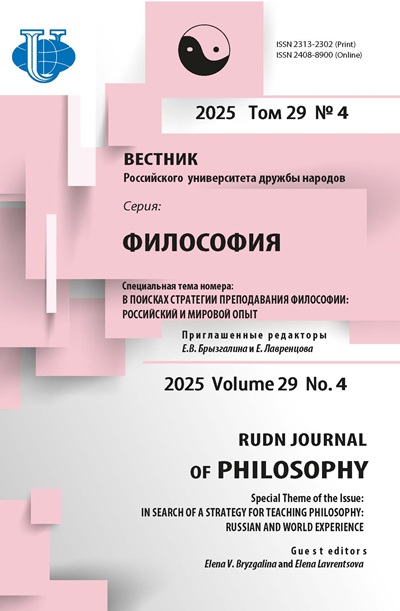Влияние цифровых технологий на модели производства и формы занятости: социально-философский анализ
- Авторы: Цуркан Е.Г.1, Дряева Э.Д.1
-
Учреждения:
- Московский государственный университет имени М.В. Ломоносова
- Выпуск: Том 23, № 4 (2019): ИСТОРИЯ ЕВРЕЙСКОЙ ФИЛОСОФИИ
- Страницы: 533-547
- Раздел: СОЦИАЛЬНАЯ ФИЛОСОФИЯ
- URL: https://journals.rudn.ru/philosophy/article/view/22619
- DOI: https://doi.org/10.22363/2313-2302-2019-23-4-533-547
- ID: 22619
Цитировать
Полный текст
Аннотация
Процесс интеграции цифровых технологий в структуру общественного производства и распределения приводит к ряду определенных тенденций капиталистического развития. Ускорение информационного обмена предоставляет возможность замены фордистской модели производства на более бережливую сетевую модель, подразумевающую выведение части сотрудников на аутсорс и снижение долгосрочности контрактных обязательств и отношений найма, что приводит к прекаризации труда определенной социальной группы, которую можно обозначить как «прекариат». Изменение условий труда приводит к изменению способов повышения производительности труда, что является причиной становления «обществ контроля», характеризующихся распределенной властью, встраиванием ранее внешнего принуждения внутрь личности, аффективным инжинирингом, пролонгацией образовательного процесса, возрастанием темпа и ритма работы, распространением проектных форм работы, заменяющих рутинные формы, и появлением ликвидной краткосрочной идентичности, свойственной представителям прекариата. Целью данного исследования является обнаружение и демонстрация глубинной взаимосвязи между этими процессами. Достижение поставленной цели в дальнейшем откроет дорогу более тщательному изучению каждого из этих процессов в отдельности, но уже исходя из перспективы их системного единства. В соответствии с целью исследования структура работы строится следующим образом: первый раздел посвящен ускорению социального времени, которое сопровождается сжиманием социального пространства, и изменением масштаба в котором могут действовать коммерческие и государственные предприятия, поскольку именно мгновенная положительная обратная связь, обеспеченная цифровой сетью, ведет к изменению инфраструктуры предприятий и трансформации производственных и логистических моделей (2 раздел). Так же ускорение обратной связи между наемным рабочим и работодателем приводит к прекаризации труда рабочего (3 раздел), сопровождающейся появлением «обществ контроля» (4 раздел).
Об авторах
Евгений Геннадьевич Цуркан
Московский государственный университет имени М.В. Ломоносова
Автор, ответственный за переписку.
Email: unigendeth@gmail.com
аспирант философского факультета
Ленинские горы, д. 1, Москва, Российская Федерация, 119991Элла Давидовна Дряева
Московский государственный университет имени М.В. Ломоносова
Email: dryaeva.ella@gmail.com
кандидат философских наук, старший преподаватель кафедры социальной философии и философии истории философского факультета
Ленинские горы, д. 1, Москва, Российская Федерация, 119991Список литературы
- Барбрук Р. Интернет-революция. М.: Ад Маргинем Пресс, 2015.
- Бауман З. Индивидуализированное общество. М.: Логос, 2005.
- Белл Д. Социальные рамки информационного общества // Новая технократическая волна на Западе. М.: Прогресс, 1986. С. 330-342.
- Валлерстайн И. Структурный кризис, или Почему капиталисты могут считать капитализм невыгодным // Есть ли будущее у капитализма? Сб. статей И. Валлерстайна, Р. Коллинза, М. Манна, Г. Дерлугьяна, К. Калхуна. М.: Изд-во Института Гайдара, 2015. С. 23-61.
- Делёз Ж. Post Scriptum к обществам контроля // Переговоры. СПб.: Наука, 2004. С. 226-233.
- Ильченко М.С., Мартьянов В.С. (ред.) Постфордизм: концепции, институты, практики. М.: Российская политическая энциклопедия, 2015.
- Кастельс М. Информационная эпоха: экономика, общество и культура. М.: ГУ ВШЭ, 2000.
- Лапидус Л.В. Цифровая экономика: управление электронным бизнесом и электронной коммерцией. М.: ИНФРА-М, 2018.
- Лапидус Л.В., Полякова Ю.М. Гигономика как новая социально-экономическая модель: развитие фрилансинга и краудсорсинга // Вестник ИЭ РАН. 2018. № 6. C. 73-89.
- Маклюэн М. Понимание медиа: Внешние расширения человека. М.: Кучково поле, 2014.
- Манович Л. Язык новых медиа. М.: Ад Маргинем Пресс, 2018.
- Миронов В.В. Компьютеризация: проблемы и перспективы (социальный аспект) // Философские науки. 1987. № 7. С. 26-36.
- Миронов В.В. Размышления о реформе российского образования. М.: Воробьев А.В., 2011.
- Нордстрем К.А., Риддерстрале Й. Бизнес в стиле фанк навсегда: Капитализм в удовольствие. М.: Манн, Иванов и Фербер, 2008.
- Рифкин Дж. Третья промышленная революция: Как горизонтальные взаимодействия меняют энергетику, экономику и мир в целом. М.: Альпина нон-фикшн, 2014.
- Сеннет Р. Коррозия характера. Новосибирск: Фонд социо-прогностических исследований «Тренды», 2004.
- Срничек Н. Капитализм платформ. М.: Изд. дом Высшей школы экономики, 2019.
- Стэндинг Г. Прекариат: новый опасный класс. М.: Ад Маргинем Пресс, 2014.
- Фишер М. Капитилистический реализм. М.: Ультракультура 2.0, 2010.
- Фуко М. Надзирать и наказывать. Рождение тюрьмы. М.: Ад Маргинем, 2015.
- Хардт М., Негри Т. Империя. М.: Праксис, 2004.
- Bourdieu P. La précarité est aujourd'hui partout // Contre-feux, Paris: Raisons d’agir, 1998. C. 96-102.
- Lanier J. Arguments for Deleting Your Social Media Accounts Right Now. New York: Henry Holt and Company, 2018.
Дополнительные файлы















